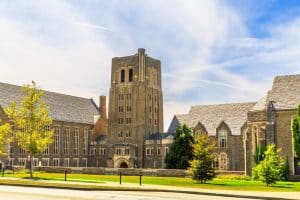Best Ivy League Schools for Law
When it comes to young adults who are looking to pursue a career in law, there are few better places to end up and study at than the Ivy Leagues. The law schools at the eight Ivy League schools are – quite simply – some of the best law schools in the entire world.
But what is the best Ivy League school for law?
Here at AdmissionSight, we believe that one major tool that all students must utilize when they are deciding what undergraduate schools, graduate school or even law school they will attend is knowledge.
That is why we have decided to take the time and do the research necessary to break down which schools are the very best schools for students who are looking to continue their education in law.
While rank is surely not the only thing that students should consider (and we’ll get into the other important factors that students should consider a little bit later), rank is certainly important!
Without further delay, let’s start breaking down what the best Ivy League school is for law school so that we can get a better idea of which schools you may want to put at the very top of your list.
No. 1 Yale Law School
There are many wonderful law schools across the United States, but there are not very many law schools anywhere in the world quite like Yale Law School. Located in New Haven, Connecticut, Yale has been ranked as the number one school in the nation by the highly respected U.S. News and World Report ever since … well … the magazine began ranking schools at all.
Currently, Yale Law School’s acceptance rate hovers right above 6.0 percent.
When it comes to the style of learning at this specifical law school, first-year students are put through the gauntlet right away thanks to their required enrollment in the Constitutional Law and Contracts, Procedure and Torts courses. Beyond that, every first-year student takes part in a small, seminar styled class.
Moreover, no first-year students at Yale Law receive letter grades. Instead, they are simply granted either a “Credit” or “Fail” grade.
From there, students gain much more freedom to select their courses and pursue the areas of law in which they are most interested in.
Some of the most popular areas of interest at Yale include Administrative Law, Corporate Law, Commercial Law, Environmental Law and much more. Beyond that, students are strongly encouraged to take part in clinics and out-of-school activities that will enliven their social and student lives and grant them many of the great opportunities that Yale has to offer.
No. 2 Harvard Law School
It is not very common for Harvard to end up number two on any list, let alone rankings when it comes to the different areas of learning, but here we are.
Harvard University, which is of course located in Cambridge, Massachusetts has played home to some of the most impactful lawyers and legal minds in the world. On top of that, Harvard is proudly the oldest continuously operating law school in the entire United States.
During the first year of law school, students take a number of foundational courses such as Civil Procedure, Constitutional Law, Contracts, Criminal Law, Legislation and Regulation, Property, and Torts.
After those important courses have been completed, students start to fulfill Harvard’s experiential requirement, which includes important clinical seminars ranging in topics from Capital Punishment to Child Advocacy.
Much like at Yale, students at Harvard Law also get incredible opportunities outside of the classroom to get involved in their community and spread their wings and test their growing knowledge about the world of law.
Of course, the Harvard Law Review, which is a student-run organization with the purpose of publishing topics of legal scholarship, is one of the most important publications of its type in the world.
No. 3 Columbia Law School
Coming in at number three is the Ivy League school that is arguably gaining ground in terms of prestigiousness and competitiveness over all of the rest is Columbia Law School.
Columbia was once thought of as a second-tier Ivy League school when it comes to Ivy League school rankings, but it is now widely considered to be near the very top in terms of difficulty, prestige and more.
Located right in the heat of Manhattan, New York, some may think that Columbia would be a better destination for students who are interested in one day taking their knowledge to the hustle and bustle of Wall Street and the financial sector.
With that being said, there are many reasons why the approximately 1,200 students at Columbia Law decide to enroll in this fantastic school. At Columbia, the first-year curriculum for law students includes courses such as Civil Procedure, Constitutional Law, Contracts, Criminal Law, Foundation-Year Moot Court, Legal Methods, Legal Practice Workshops, Property Law, Torts, and a first-year elective.
On top of that, Columbia Law School offers six-credit hour experimental requirements. Students can fulfill this requirement in their curriculum by taking part in clinics, externships and pro-bono legal work.
One fascinating aspect of Columbia law is that in 2006, the school became the first institution to offer a clinic in sexuality and gender law.
No. 4 University of Pennsylvania Law School
Located in one of the most historically significant cities in the United States – Philadelphia – the University of Pennsylvania Law School is a comparatively small law school compared to many others on this list, with just about 800 students in total.
Penn Law school, like all of the other schools on this list frankly, have a proud and impressive history. One aspect of that history is that it is home to the oldest continuously published legal periodical, the Law Review, which was first published in 1852.
One thing that sets UPenn Law School apart from the rest of the schools when it comes to the best Ivy League school for law is that it offers an incredibly unique cross-disciplinary approach to the study of law.
At UPenn Law, all of the offered programs are fully integrated with Penn’s professional and graduate schools. On top of this interdisciplinary approach to the curriculum, students can take up to four courses outside of the law school and count them towards their eventual degree.
This allows for students to leave the law school after graduating with the sense that they have gained a well-rounded education in regards to both the legal world and other important areas of learning as well.
Finally, the law school and the school of engineering offers the highly unique Law & Technology Program, which is dedicated to helping students going into law prepare for the ever-changing laws regarding our world and technology.
No. 5 Cornell Law School
Though this is the last school on this list (we’ll get to why in just a little bit), students should not consider getting into Cornell Law as anything but an incredible achievement. Cornell is especially a fantastic option for students who are looking to get into international law, as Cornell offers one of the best international law programs in the world.
First-year law students at Cornell take required coursework in Civil Procedure, Constitutional Law, Contracts, Criminal Law, Lawyering, Property, and Torts. After that, in their second and their years of study, students get the option to take courses of their choice as long as they are able to fulfill their degree requirements.
Once students get to their third year, they can select one of the following concentration areas: Advocacy, Business Law and Regulation, General Practice, or Public Law.
Cornell also offers valuable clinical opportunities to its students through a number of organizations including the Low-Income Taxpayer Law and Accounting Practicum, the Cornell Center for Women, Justice, Economy and Technology, and many more.
Where are the other three schools?
As you may have noticed by now, there are several schools that are part of the Ivy League that are missing from this list! Those three schools are the highly prestigious institutions of Princeton University, Brown University and Dartmouth College.
The simple reason for their absence is because these three schools do not have law schools and do not offer the J.D., L.L.M., or S.J.D. degree. That is not to say, however, that any three of the schools are not great options for undergraduate students who are interested in pursuing a law degree once they graduate!
Traits that will help students get into top law schools
While many thousands of aspiring lawyers apply to the law schools connected to the best Ivy League school for law, there are many, many students each year who do not get in.
After all, simply fulfilling the Ivy League Law admissions criteria does not serve as the only benchmark that students need to meet in order to get in. Truth be told, students have to make sure that they are going above and beyond what is expected of them so that they can more effectively improve their chances of getting in.
But what are the traits that top law schools – both within and outside of the Ivy League – look for? We at AdmissionSight simply would not be doing our job if we did not give you some of the most important things to keep in mind.
So, whether you are an undergraduate student starting to make your list of law schools to target, a student who has just began their undergraduate education and wants to be as prepared as possible, or even a high schooler who is looking far ahead into the future, then you have come to the right place!
Let’s get started.
Incredible grades and LSAT scores
This probably should not come as much of a surprise, but it is so important that we thought we would start our list with this consideration. The truth is, just like top grades in high school are incredibly important for students who want to get accepted to top undergraduate programs, top grades in undergrad programs are crucially important for students who want to get into prestigious Ivy League law schools.
Beyond that, just like the SAT and ACT serve as a standardized benchmark for students graduating to undergrad, the LSAT serves as a major benchmark for admissions officers at law schools across the country.
The perfect score for the LSAT is a 180, and the average scores of the five Ivy League law schools will give you a fantastic idea of just how selective these schools truly are:
- Average LSAT score at Columbia is 172
- Average LSAT score at Cornell is 168
- Average LSAT score at Harvard is 173
- Average LSAT score at Penn is 170
- Average LSAT score at Yale is 173
From those numbers alone, you can grasp just how exceptional the students are that are getting into these schools. For that reason, if you are dedicated to getting into an Ivy League program, make sure you are taking your preparation for the LSAT incredibly seriously so that you give yourself as good a chance as possible to earn an impressive score.
Real-world experience
Another very important trait that students should aim to fulfill if they are looking to get into a top law school, such as an Ivy League law school, is to earn fantastic real-world experience during their undergraduate years.
In fact, this clear desire for real-world experience leads many students to take a year or two off of school in between undergraduate school and applying to law school. Many students will look for great ways to volunteer or get involved in the world of law in other aspects during those years off.
For students who are looking to apply to law school directly after graduating undergrad, they should make it a top priority to pursue extracurricular activities during undergrad that will appeal to law school admissions officers.
Strong endorsements
Just like the letters of recommendation are important for students who are looking to get into top undergrad programs, the very same thing can be said for students who are looking to apply to the best ivy League school for law.
It is generally agreed upon amongst admissions officers at top law schools that one thing that can take a good law school application to a great one is a stellar recommendation.
Students should look for individuals who are willing to not only sing a student’s praises, but really champion them in the form of an amazing letter. Moreover, a letter of recommendation means most when it is coming from someone who is directly involved in the world of law, such as a working attorney or judge.
A clear reason for wanting to pursue law school
This may be the most important thing to keep in mind above everything else on this list of traits that top law schools and Ivy League law schools are looking for.
If you ask any lawyer working today about attending law school, they will likely all tell you one thing. “Don’t go to law school unless you are sure that you want to be a lawyer.”
This may seem like a cute little warning, but any young student who is interested in attending law school should really be sure that they are passionate about the profession. Law school is likely going to be anyone’s hardest school experience in their life. Competition is tough, the exams are tougher, and the pressure that students feel is very real.
On top of that, there is no guarantee that students who simply graduate law school will even get a job right out of graduation. They are going to have to work extremely hard to try to end up at the top of their class in the hopes of getting a great job right out of school.
For that reason, students should be able to make it abundantly clear on their law school applications why they are planning on getting a law degree and what they plan to do with that degree once you actually graduate.
Need more help getting into an Ivy League law school?
Now that you know a little bit more about law school at the Ivy Leagues, chances are pretty good that you have a lot more questions. Well, believe it or not that is actually a good thing!
The truth is that if you are truly interested in attending an Ivy League law school, you are going to work hard, garner a lot of information and set clear goals to achieve.
When it comes to getting into the Ivy Leagues, AdmissionSight can absolutely help. We have helped students from all over the world achieve their university admissions goals and get into some of the top schools in the world.
In fact, our success rate of getting students into Ivy League or other top 10 undergraduate programs is an incredible 75 percent.
If you are interested in learning more about what we can do for you and your admissions goals, contact us today for a free consultation.










































